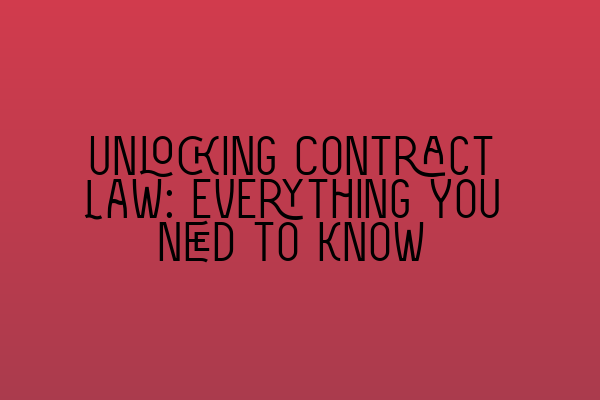Unlocking Contract Law: Everything You Need to Know
In the world of law, contracts are the backbone of business and personal interactions. Understanding contract law is essential for individuals and companies alike, as it governs the agreements that bind parties together. Whether you are a legal professional, a business owner, or just curious about the intricacies of the law, this comprehensive guide will unlock the secrets of contract law.
1. What is Contract Law?
Contract law is a branch of law that deals with the formation, interpretation, and enforcement of contracts. A contract is a legally binding agreement between two or more parties, in which they agree to perform certain obligations. These obligations could be related to the exchange of goods, provision of services, or any other specific terms that the parties agree upon.
2. Essential Elements of a Contract
For a contract to be legally enforceable, it must contain certain essential elements. These elements include an offer, acceptance, consideration, capacity, and legality. An offer is a proposal by one party to enter into a contract, while acceptance is the agreement to the terms of the offer. Consideration refers to something of value being exchanged between the parties, and capacity ensures that both parties are legally competent to enter into the contract. Finally, the contract’s subject matter must be legal and not involve any prohibited activities.
3. Types of Contracts
Contracts come in various forms, depending on the nature of the agreement. Some common types of contracts include:
– Express Contracts: These contracts are explicitly stated, either verbally or in writing, and all terms are clearly defined.
– Implied Contracts: Unlike express contracts, implied contracts are not explicitly stated. They are inferred from the conduct of the parties involved.
– Unilateral Contracts: In a unilateral contract, one party makes a promise in exchange for the other party’s performance. The contract is only formed when the second party performs the required action.
– Bilateral Contracts: Bilateral contracts involve the exchange of promises between two parties. Both parties are bound by their respective promises.
– Executed Contracts: An executed contract is one where all parties have fulfilled their obligations.
– Executory Contracts: In an executory contract, one or more parties have yet to fulfill their obligations.
4. Contract Formation
To form a contract, the essential elements must be present, as previously mentioned. Additionally, the parties must have a mutual agreement or consensus on all material terms. This means that both parties understand and accept the terms of the contract.
5. Contract Interpretation
Sometimes the terms of a contract may be ambiguous or open to interpretation. In such cases, the courts will apply various principles to interpret the contract based on the intentions of the parties. The court may consider the language used, the context, and any relevant surrounding circumstances.
6. Breach of Contract
When one party fails to fulfill its obligations as outlined in the contract, it is considered a breach of contract. The non-breaching party may seek remedies such as specific performance, where the breaching party is compelled to fulfill its obligations, or monetary damages to compensate for any losses suffered.
7. Contract Disputes and Resolution
In the event of a contract dispute, parties have several options for resolving their differences. They may choose negotiation, mediation, or arbitration as alternative dispute resolution methods. If these methods fail, parties can resort to litigation and seek resolution through the court system.
8. Hiring a Contract Law Solicitor
To navigate the complexities of contract law, it is often beneficial to seek the guidance of a contract law solicitor. A solicitor specializing in contract law can provide expert advice, draft or review contracts, and represent you in contract-related disputes.
By understanding contract law and its intricacies, you can protect your rights and interests in contractual agreements. Remember, contracts are the foundation of business relationships, and having a strong grasp of contract law is crucial for success.
For more insights into the legal profession and related topics, check out these related articles:
– Barrister vs. Solicitor: A Comprehensive Comparison
– Exploring Different Solicitor Specializations: Finding Your Niche
– Embracing the Rise of Virtual Law Practices
– Navigating the Maze: Demystifying Ethical Responsibilities of Solicitors
– Unveiling Real-Life Case Studies: Insights into Legal Practice and Decision-Making
Remember, knowledge is power, and the more you educate yourself about contract law, the better equipped you will be to navigate the complexities of contractual agreements.
